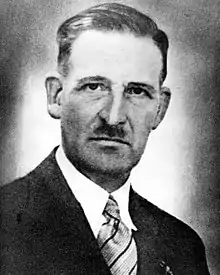Heinrich zu Dohna-Schlobitten
Heinrich Burggraf und Graf zu Dohna-Schlobitten (15 October 1882 – 14 September 1944) was a German major general and resistance fighter in the 20 July Plot to assassinate Adolf Hitler at the Wolf's Lair in East Prussia. He was a Knight of Justice of the Order of St John, which was regarded with disfavour by the Nazis.[1]
Heinrich Burggraf und Graf zu Dohna-Schlobitten | |
|---|---|
 | |
| Born | 15 October 1882 Waldburg/Königsberg, East Prussia, Imperial Germany |
| Died | 14 September 1944 (aged 61) Plötzensee Prison, Berlin, Nazi Germany |
| Cause of death | Execution by hanging |
| Allegiance | |
| Service/ | Army |
| Years of service | 1901–19 1939–43 |
| Rank | Generalmajor |
| Battles/wars | World War I World War II |
Early life
Dohna-Schlobitten was born to Eberhard Graf zu Dohna-Schlobitten (1846-1905) and his wife Elisabeth née Gräfin von Kanitz (1851-1936) in Waldburg (now Nikolajewka, Russia) near Königsberg, East Prussia, the son of a famous Prussian noble family. He grew up on his parent's estate near Königsberg, where he was strongly influenced by this mother's Christian faith. After graduating from high school in 1901, he began his career as a professional soldier and was already an ensign (Fahnenjunker) in the Prussian Army by 1901. In the First World War, he served as a General Staff officer (Generalstabsoffizier) in the 240th Infantry Division on the Western Front. He was released from the army as a Major in 1919. He subsequently became a member of the Baltische Landwehr but on ethical grounds he chose to leave the military and study agriculture. In 1920 he married Maria-Agnes von Borcke (1895-1983). He devoted himself to Tolksdorf, his wife's family estate. Later on he opposed Nazism and became active in the Confessing Church's Bruderrat ("brother council") in the old-Prussian Ecclesiastical Province of East Prussia.[2]
World War II
In 1939, Dohna-Schlobitten was remobilized as a General Staff officer and was appointed as Chief of Staff in Defence District I in Königsberg, later to be promoted to Chief of Staff, Army Group Centre. He acted as a corps leader in France, Norway and Finland.
Dohna-Schlobitten's last post was as major general and Chief of the Acting General Command in Danzig (now Gdańsk, Poland), before leaving the Wehrmacht at his own request in 1943.[2] Thereafter, he earned his livelihood from farming in Tolksdorf (now Tołkiny, Poland) in East Prussia.
Dohna-Schlobitten maintained contacts with resistance leader Carl Friedrich Goerdeler, and was soon involved in Helmuth James von Moltke's Kreisau Circle through fellow aristocrat Peter Yorck von Wartenburg. Had the attempt on Hitler's life on 20 July 1944 succeeded, Dohna-Schlobitten was foreseen as East Prussia's new provincial administrator.[2] The day after Claus Schenk von Stauffenberg's failed assassination attempt with a briefcase bomb, Dohna-Schlobitten and his wife were arrested, and on 14 September 1944, he was sentenced to death in Roland Freisler's infamous Nazi Volksgerichtshof (People's Court). He was executed the same day at Plötzensee Prison, along with Nikolaus von Üxküll-Gyllenband, Hermann Josef Wehrle and Michael von Matuschka.[3]
Dohna was married to Maria-Agnes née von Borcke, with whom he had a daughter Ursula (1922-2022) and three sons, Lothar (1924-2021), Fabian (1926-2006) and Karl Albrecht (1921-1941).[2]. Maria-Agnes was sent to the Ravensbrück concentration camp after her arrest on 21 July 1944. She survived the war and died in 1983.
References
- "The Knights of Saint John in Germany". GREAT ORDERS OF CHIVALRY. Retrieved 20 Nov 2013.
- Biography at German Resistance Memorial Center
- Biography Archived 2016-03-04 at the Wayback Machine of Michael Graf von Matuschka (in German)
Notes
Regarding personal names: Graf was a title before 1919, but now is regarded as part of the surname. It is translated as Count. Before the August 1919 abolition of nobility as a legal class, titles preceded the full name when given (Graf Helmuth James von Moltke). Since 1919, these titles, along with any nobiliary prefix (von, zu, etc.), can be used, but are regarded as a dependent part of the surname, and thus come after any given names (Helmuth James Graf von Moltke). Titles and all dependent parts of surnames are ignored in alphabetical sorting. The feminine form is Gräfin.